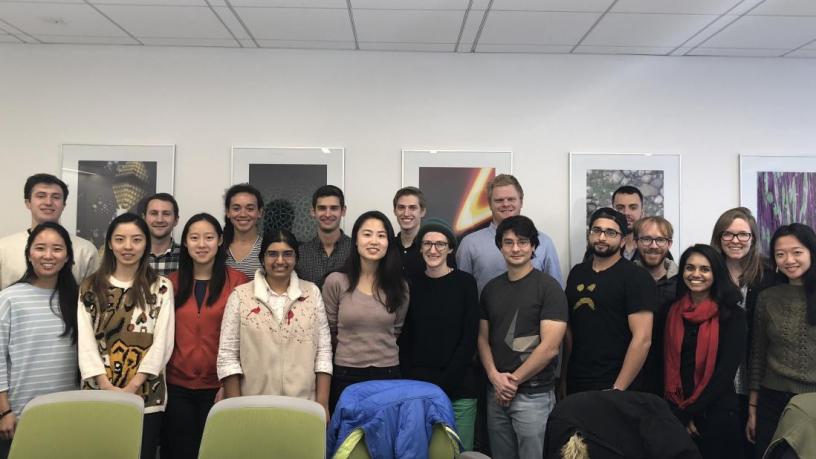Graduate Students with NSF Fellowships Gather to Share Advice

“When should I apply for an internship?”, “How do I fill out my tax forms?”
At Columbia Engineering, 47 students receive funding through the Graduate Research Fellowship Program (GRFP) of the National Science Foundation (NSF), a singular honor that affords students many opportunities, while also raising questions about how best to utilize the three-year grant for their educational experience.
The desire to better navigate life as a Fellow and connect with others in the program prompted first-year graduate student Kaveri Thakoor to request a luncheon for fellow Columbia engineers with GRFP Fellowships.
“I wanted us to be able to talk and learn from one another,” said Thakoor who studies machine learning and vision science in the biomedical engineering department.
In response, Graduate Student Affairs hosted a lunch for the Fellows on Friday, November 16. 26 Fellows with research interests ranging from polymer physics and nanomaterials to characterizing flood risks and building computational tools for creative writing attended the event. Students discussed summer opportunities and a new internship program while third and fourth-year students gave timely advice on when to take funding, teaching assistantships, the importance of keeping documentation, and how to advocate for oneself.
Megan Armstrong, a biomaterials investigator who is interested in policy, shared her recent experience with grant applications and working with government agencies. Importantly, students engaged with new faces and made new friends.
“I’d like to have more of this type of thing,” said Fellow Brittany Marshall, who studies orthopedics under Professor Stavros Thomopoulos at the Columbia University Medical Center. “We don’t always know who the other fellows are.”
Marshall attended the lunch with Josephine Wu, a second-year graduate student working under University Professor and Mikati Foundation Professor of Biomedical Engineering and Medicine Gordana Vunjak-Novakovic. Both thought small-scale events such as the lunch would help build a stronger sense of community for graduate students, especially for those studying at the Medical Center or other locations off of the Morningside Heights campus.
“SEAS is so big and some events can be overwhelming,” said Wu.
Graduate Student Affairs hopes to provide more such events for students in the future. In late November, they will host a “Pathway to Postdoc Panel” on the 28th for doctoral students to learn more about obtaining a postdoc position and a lunch for current postdocs on November 30th.
The GRFP is a prestigious award that supports high-potential and early career science and engineering students for up to three years as they pursue a Master’s or doctoral degree in the areas of science, technology, engineering, and mathematics. Critical to a candidate’s application is proving that the intended course of study has both intellectual merit and broader impact.
While Columbia Engineering guarantees full-funding to graduate students, the Fellowship support allows students the freedom to take advantage of additional educational opportunities for research and professional development. Marshall, for instance, recently used some of her funding toward attending the World Congress of Biomechanical Engineering in Dublin.
“It lets us have these experiences,” she said.
In 2018, the NSF offered 2,000 fellowship awards from 12,000 applicants across the United States. Past GRFP Fellows include 42 Nobel Prize winners, former U.S. Secretary of Energy, Steven Chu, and Google founder, Sergey Brin.
